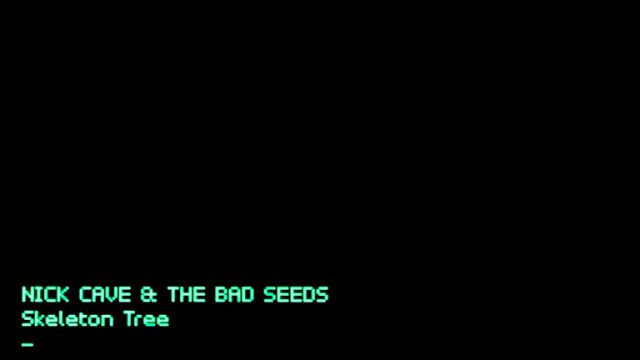Nick Cave is one of rock’s most successful chameleons. Like Bob Dylan and David Bowie before him, Cave vaults and pivots between personas, always committing fully to each one. There was the gleeful silent movie villain of Tender Prey; the feral lothario of Let Love In; the shameless Hemingway imitator of No More Shall We Part; and for most of Dig, Lazarus, Dig!!! it sounds as though Cave is on a bad mushroom trip. Now, on Skeleton Tree, his sixteenth album with backing band the Bad Seeds, Cave dons his most fearless mask yet: none.
It would be tasteless to go into the tragic circumstances of the last year of Cave’s life, but the death of his son Arthur permeates every second of Skeleton Tree. This is an album borne of deep, existential despair, the kind that seems unreal because we as humans are unable to fully process it. The music is sparse, ghostlike; this is a wasteland, with Cave as its sole surviving inhabitant, perched at his piano, surrounded by the ghosts of machines.
“Skeleton Tree is about more than catharsis; it is about exorcism.”
Acoustic instruments are barely present (there are some drums on “I Need You,” and a hint of guitar on the title track). Sonically and atmospherically, these songs call to mind Cave’s film scores (which he composed with Warren Ellis, violinist of the Bad Seeds) for movies like The Road and The Assassination of Jesse James by the Coward Robert Ford. It’s dark, sure, but it’s more than that: it’s elemental, indescribable in an almost Lovecraftian sense. Much of Skeleton Tree sounds like thoughts.
The most striking change between Skeleton Tree and the rest of Cave’s oeuvre, even his most recent album Push the Sky Away, is in his vocals. Cave boasts one of the most confident, sensual baritones in contemporary music, and on Skeleton Tree‘s eight songs he allows it, almost heretically, to falter, to strain, to crack. When he wails the chorus of “I Need You,” just those three simple words, there is a mournfulness in his voice that you never want to experience yourself.
Much of this review makes it sound like Skeleton Tree is more akin to a chamber piece than a rock album; that’s somewhat true, but not entirely. ’80s-style synth pervades “I Need You” (calling to mind composer Cliff Martinez’s work on The Knick) and “Anthrocene” is propelled by a frenetic, staccato drum beat, set counterintuitively, yet effectively, against Cave’s spectral vocals. On “Rings of Saturn,” Cave experiments with stream-of-consciousness poetry that would make Lou Reed proud: “Her eyes that look at me through a rainy hair/Two round holes where the air buckles and rushes in/Her body, moon blue, was a jellyfish/And I’m breathing deep and I’m there and also not there.” That sense of “there and also not there” is present on all of Skeleton Tree‘s songs, which convey a sense of displacement, not only temporal or spatial but also emotional.
“Distant Sky” shows that hope and despair can co-exist, and that one is as valid as the other.”
There is uplift to be found here, too; also hope, and grace. “Distant Sky,” at any given time my favorite track on the album, is lovely and liturgical, anchored by an organ that somehow replicates the sound of light shining on water. Guest vocalist Else Torp, a classical soprano from Denmark, glides onto the track like an angel, which sounds like a cliché (and okay, maybe it is), but is really the only way to describe the impact she has on one of Skeleton Tree‘s most hopeful songs. Her clarion voice cuts through the previous six songs’ despair without undermining the feeling. “Distant Sky” shows that hope and despair can co-exist, and that one is as valid as the other.
Skeleton Tree is about more than catharsis; it is about exorcism. It’s personal in a way not heard from Cave since The Boatman’s Call, and at times feels more like a diary than an album, a diary we wouldn’t read unless its author asked us to. It’s a strikingly intimate album, and something like a masterpiece, but let’s hope, for Cave’s sake, that he’ll never have to record another one like it.

